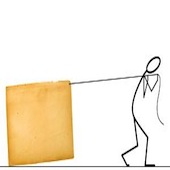
Perhaps you feel guilty about eating disorder behaviors such as restricting food intake, overeating, bingeing and purging or over-exercising. Or, your guilt may not be limited to eating disorder related matters. It may be rooted in deeper issues such as guilt over relationships, school, parenting or decisions, and the list could go on.
What do you do with this guilt? Do you beat yourself up with it, telling yourself that you deserve to feel bad for what you’ve done? This is a common reaction to guilt, but it does nothing to propel you forward in your recovery. If anything, that guilt can fuel the eating disorder and drive you to unhealthy behaviors. But what else can you do?
First of all, determine whether the feeling is true guilt or false guilt. What’s the difference? True guilt is a result of sin. For example, if I lie to someone and say I’ve eaten when I haven’t, that’s sin. If I feel guilty because I can’t meet someone’s unrealistic expectations, even though I’ve done my best, that guilt isn’t a result of sin. Therefore, it’s false guilt.
Let’s discuss true guilt first. This is actually an asset because it’s a signal to us that we’ve done something wrong, giving us an opportunity to confess. When we confess, we agree with God that we’ve sinned. But if we stop there, we can easily fall back into beating ourselves us over guilt.
We need to take to heart the truth in I John 1:9, “If we confess our sins, he is faithful and just and will forgive us our sins and purify us from all unrighteousness.” (NIV) He forgives us and cleanses us. That sin is no more. This means we no longer have to feel guilty about it.
What do you do with false guilt? Give it to the Lord. Picture yourself getting rid of it: Pick it up and carry it to Him, throw it off you, bury it, talk back to it and tell it to take a hike. Do whatever image/action is most effective for you. The main thing is to let it go so it will no longer affect you. This false guilt may have been there for a long time and have deep roots, so it might take several attempts to successfully release it. Let go as many times as it takes. That may be wearing, but it will be well worth it when you find yourself free of its weight and influence. Keep this in mind with false guilt:, and also with lingering guilt after you’ve confessed and been forgiven for sin.
If you’re unsure whether your guilt is true or false, ask God to help you discern which it is. Sincerely listen for His voice and open your heart to the Holy Spirit’s clarification or conviction, whichever it may be.
Whether the guilt you feel is the result of sin or whether it’s false guilt, the answer is the same: The Lord Jesus Christ. Either way, He is there to help you sort through it, let it go, confess it, and strengthen you to move forward. Allow Him to do His work in you. Invite his power into your recovery.
RELATED
Eating Foods Without Guilt, Constance Rhodes
Getting Past our Past, Ruth Povey
Guilty Poster, video resource
